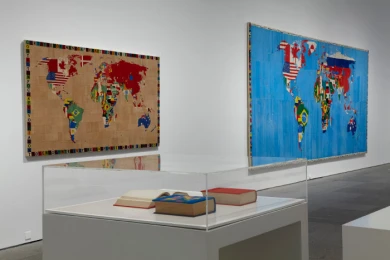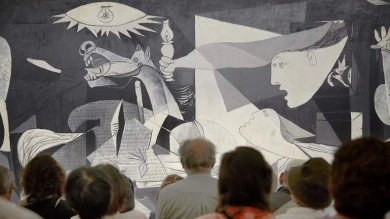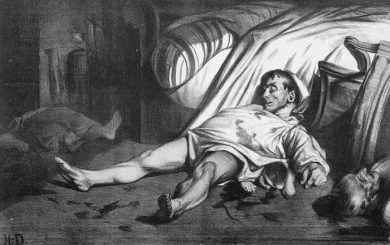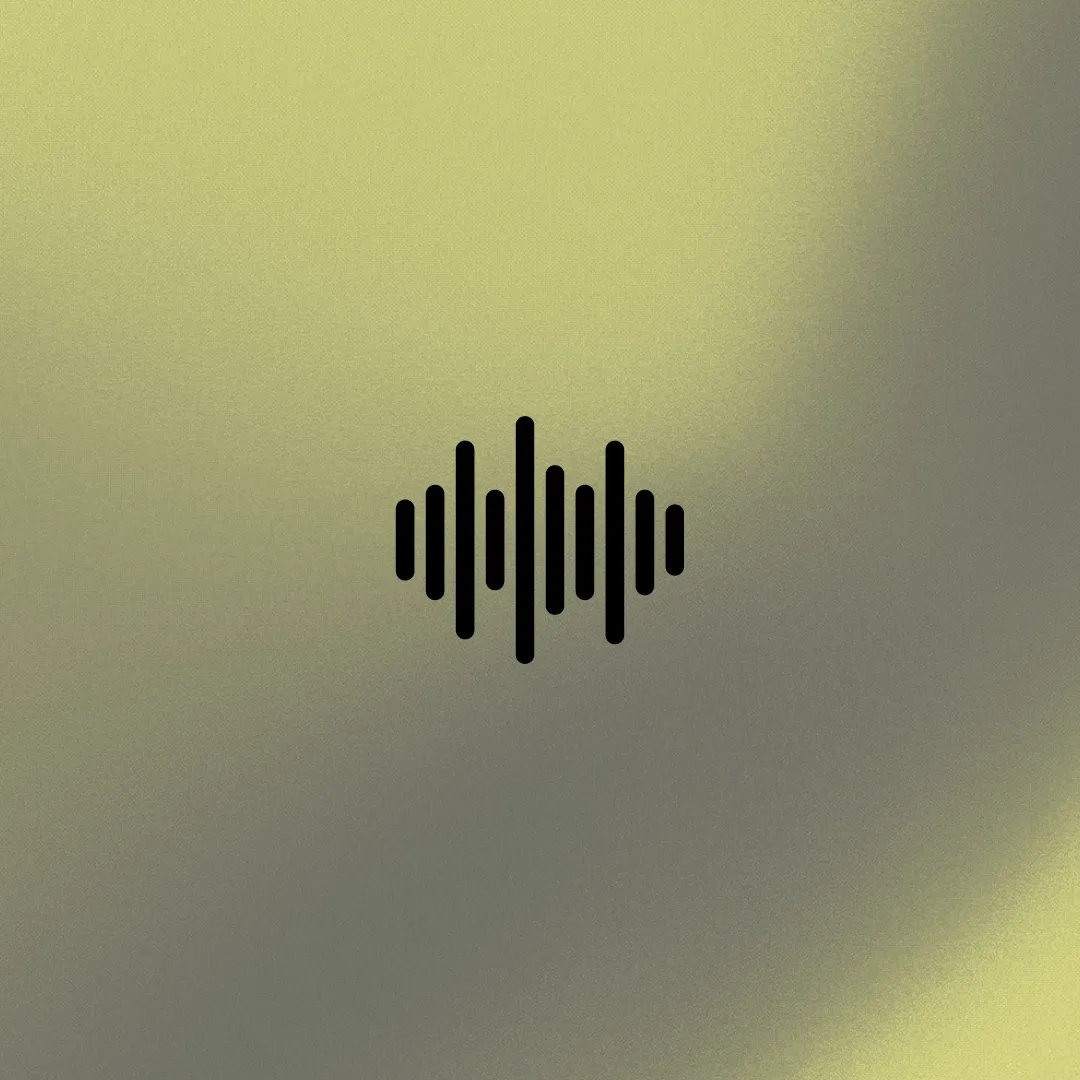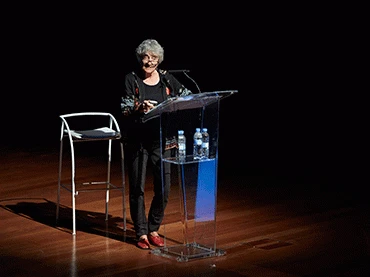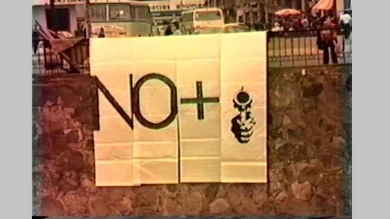-
June 9, 2015 Nouvel Building, Study Center
Marcel Broodthaers. Research Seminar
Attendance: free admission by writing to centrodeestudios@museoreinasofia.es indicating your interest and training. The seminar will be held in English without simultaneous interpretation. Limited places.
In 1968 Marcel Broodthaers founded the Museum of Modern Art. Department of Eagles, a museum with no collection and no definitive location, divided into different sections reflecting, through art reproductions, daily objects and images, the iconography of power in its clearest manifestation. In 1970, he added the “Financial Section”, the function of which was to sell the museum by destabilising market prices. Broodthaers appeared to envisage the catastrophic reverse of the current modern art museum: an institution devoted to exhibiting and certifying the miracle of the transformation of nothing into the unimaginable accumulation of value. Is it possible, in light of the Belgian’s work, to counter this model with the one in which the museum is an institution that inherits the illustrated public sphere? Is it possible to imagine another affirmative and critical museum that structures and deconstructs its public and counteracts the logic of the fully integrated museum?
-
June 10, 2015 Nouvel Building, Auditorium 200
From Birkenau to Dresden: Memory in the Abstract Works of Gerhard Richter
Attendance: free, until full capacity is reached
Gerhard Richter’s most recent work, entitled Birkenau, is inspired by the publication of four photographs secretly taken by prisoners at Auschwitz and subsequently published by the French art historian Georges Didi- Hubermann in his book Images in Spite of All (2004). Richter’s group of abstract works, after being reformulated in the space of a year, were duplicated and digitised and installed this year in Dresden, the artist’s hometown, for the 70th anniversary of the liberation of Auschwitz. Connecting his city with the history of German Nazism, precisely in the most notorious location of destruction caused by Allied bombing, once again Richter places his spectators before the height of mnemonic challenges, with an unmanageable past and a continued reflection on human brutality in the 20th century and in the present.
Benjamin Buchloh
From Birkenau to Dresden: Memory in the Abstract Works of Gerhard Richter
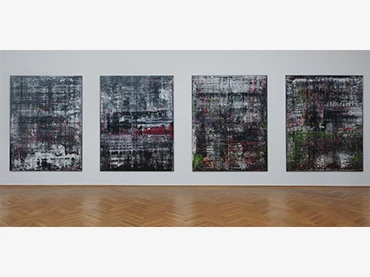
Held on 09, 10 Jun 2015
Started in 2010, the Museo Reina Sofía’s programme of master lectures marks the beginning, or end, of the annual academic activity conducted in the Museo, comprising a series of MAs, study programmes, debate groups and research residencies, run in collaboration with different universities.
Following the previous master lectures, which looked to recognise the methodological tensions that have transformed art history in recent years, by Linda Nochlin (2010), T.J Clark (2011), Simón Marchán Fiz (2012) and Hans Belting (2013), this year’s edition is centred upon Benjamin Buchloh.
On this occasion, it will be split into two sessions to focus on two artists and two modes of production that have characterised the work of the German historian, found between critique and the university. One is a research seminar on Marcel Broodthaers and the other a public lecture focused on Gerard Richter.
Education programme developed under the patronage of

Participants
Benjamin Buchloh is editor of the journals Interfunktionen (1969–1975) and October (since 1990) and Andrew W. Mellon Professor of Modern Art from the Department of Art History and Architecture at Harvard University. His work has keenly recovered the critical legacy and structural challenge of artists such as Marcel Broodthaers, Michael Asher, Dan Graham and James Coleman. The essays compiled in Neo-Avantgarde and Culture Industry. Essays on European and American Art from 1955 to 1975 (The MIT Press, 2000) are characterised by their analysis of the return to the idea of the Avant-garde in changing post-war capitalism and their pivotal definition of the so-called institutional critique as a driving force behind conceptual practice in contrast to the culture managed by cultural institutions in the same epoch. By the same token, the tension between opposing historiographical categories dominates both Formalism and Historicity: Models and Methods in Twentieth-Century Art (2004), (Akal, 2004) and Art Since 1900: Modernity, Antimodernity, Postmodernity (Akal, 2006, co-edited with Rosalind Krauss, Yve Alain Bois and Hal Foster). The deeply held conviction in the critical and resistant role of the museum and contemporary art in the trivialisation of entertainment is one of the defining traits of Benjamin Buchloh’s writing and thinking.
Más actividades

Difficulty. Forms and Political Effects of Deviation in Writing and Contemporary Art
23 February – 14 December 2026 – Check programme
Difficulty. Forms and Political Effects of Deviation in Writing and Contemporary Art is a study group aligned towards thinking about how certain contemporary artistic and cultural practices resist the referentiality that dominates the logics of production and the consumption of present-day art. At the centre of this proposal are the concepts of difficulty and deviation, under which it brings together any procedure capable of preventing artistic forms from being absorbed by a meaning that appears previous to and independent from its expression. By ensuring the perceptibility of their languages, difficulty invites us to think of meaning as the effect of a signifying tension; that is, as a productive and creative activity which, from the materiality of art objects, frees aesthetic experience from the representational mandate and those who participate in it from the passiveness associated with tasks of mimesis and decoding.
The economy of the referential norm translates the social logic of capitalism, where insidious forms of capturing subjectivity and meaning operate. In the early 1980s, and adopting a Marxist framework, poet Ron Silliman highlighted how this logic entailed separating language from any mark, gesture, script, form or syntax that might link it to the conditions of its production, rendering it fetichised (as if without a subject) and alienating its users in a use for which they are not responsible. This double dispossession encodes the political strategy of referential objectivity: with no subject and no trace of its own consistency, language is merely an object, that reality in which it disappears.
The political uses of referentiality, more sophisticated today than ever before, sustain the neoliberal-extractivist phase of capitalism that crosses through present-day societies politically, economically and aesthetically. Against them, fugitive artistic practices emerge which, drawing from Black and Queer studies and other subaltern critical positions, reject the objective limits of what exists, invent forms to name what lies outside what has already been named, and return to subjects the capacity to participate in processes of emission and interpretation.
Read from the standpoint of artistic work, the objective capture of referentiality may be called transparency. Viewed from a social contract that reproduces inequality in fixed identity positions, transparent in this objectivity are, precisely, the discourses that maintain the status quo of domination. Opposite the inferno of these discourses, this group aims to collectively explore, through deviant or fugitive works, the paradise of language that Monique Wittig encountered in the estranged practices of literature. For the political potency of difficulty — that is, its contribution to the utopia of a free language among equals — depends on making visible, first, its own deviations; from there, the norm that those deviations transgress; and finally, the narrowness of a norm which in no way exhausts the possibilities ofsaying, signifying, referring and producing a world.
From this denouncement of referential alienation, fetishisation and capture, Difficulty. Forms and Political Effects of Deviation in Writing and Contemporary Art turns its attention to the strategies of resistance deployed by contemporary artists and poets. Its interest is directed towards proposals as evidently difficult or evasive as those of Gertrude Stein, Lyn Hejinian, Theresa Hak Kyung Cha, Kameelah Janan Rasheed, Kathy Acker, María Salgado and Ricardo Carreira, and as seemingly simple as those of Fernanda Laguna, Felix Gonzalez Torres and Cecilia Vicuña, among other examples that can be added according to the desires and dynamics of the group.
The ten study group sessions, held between February and December, combine theoretical seminars, work with artworks from the Museo Reina Sofía’s Collections and exhibitions, reading workshops and public programs. All these formats serve as spaces of encounter to think commonly about certain problems of poetics — that is, certain political questions — of contemporary writing and art.
Difficulty. Forms and Political Effects of Deviation in Writing and Contemporary Art inaugurates the research line Goodbye, Representation, through which the Museo Reina Sofía’s Studies Directorship seeks to explore the emergence of contemporary artistic and cultural practices which move away from representation as a dominant aesthetic-political strategy and redirect their attention toward artistic languages that question the tendency to point, name and fix, advocating instead for fugitive aesthetics. Over its three-year duration, this research line materializes in study groups, seminars, screenings and other forms of public programming.

Institutional Decentralisation
Thursday, 21 May 2026 – 5:30pm
This series is organised by equipoMotor, a group of teenagers, young people and older people who have participated in the Museo Reina Sofía’s previous community education projects, and is structured around four themed blocks that pivot on the monstrous.
This fourth and final session centres on films that take the museum away from its axis and make it gaze from the edges. Pieces that work with that which is normally left out: peripheral territories, unpolished aesthetics, clumsy gestures full of intent. Instead of possessing an institutional lustre, here they are rough, precarious and strange in appearance, legitimate forms of making and showing culture. The idea is to think about what happens when central authority is displaced, when the ugly and the uncomfortable are not hidden, when they are recognised as part of the commons. Film that does not seek to be to one’s liking, but to open space and allow other ways of seeing and inhabiting the museum to enter stage.

Intergenerationality
Thursday, 9 April 2026 – 5:30pm
This series is organised by equipoMotor, a group of teenagers, young people and older people who have participated in the Museo Reina Sofía’s previous community education projects, and is structured around four themed blocks that pivot on the monstrous.
The third session gazes at film as a place from which to dismantle the idea of one sole history and one sole time. From a decolonial and queer perspective, it explores films which break the straight line of past-present-future, which mix memories, slow progress and leave space for rhythms which customarily make no room for official accounts. Here the images open cracks through which bodies, voices and affects appear, disrupting archive and questioning who narrates, and from where and for whom. The proposal is at once simple and ambitious: use film to imagine other modes of remembering, belonging and projecting futures we have not yet been able to live.

Remedios Zafra
Thursday March 19, 2026 - 19:00 h
The José Luis Brea Chair, dedicated to reflecting on the image and the epistemology of visuality in contemporary culture, opens its program with an inaugural lecture by essayist and thinker Remedios Zafra.
“That the contemporary antifeminist upsurge is constructed as an anti-intellectual drive is no coincidence; the two feed into one another. To advance a reactionary discourse that defends inequality, it is necessary to challenge gender studies and gender-equality policies, but also to devalue the very foundations of knowledge in which these have been most intensely developed over recent decades—while also undermining their institutional support: universities, art and research centers, and academic culture.
Feminism has been deeply linked to the affirmation of the most committed humanist thought. Periods of enlightenment and moments of transition toward more just social forms—sustained by education—have been when feminist demands have emerged most strongly. Awareness and achievements in equality increase when education plays a leading social role; thus, devaluing intellectual work also contributes to harming feminism, and vice versa, insofar as the bond between knowledge and feminism is not only conceptual and historical, but also intimate and political.
Today, antifeminism is used globally as the symbolic adhesive of far-right movements, in parallel with the devaluation of forms of knowledge emerging from the university and from science—mistreated by hoaxes and disinformation on social networks and through the spectacularization of life mediated by screens. These are consequences bound up with the primacy of a scopic value that for some time has been denigrating thought and positioning what is most seen as what is most valuable within the normalized mediation of technology. This inertia coexists with techno-libertarian proclamations that reactivate a patriarchy that uses the resentment of many men as a seductive and cohesive force to preserve and inflame privileges in the new world as techno-scenario.
This lecture will address this epochal context, delving into the synchronicity of these upsurges through an additional parallel between forms of patriarchal domination and techno-labor domination. A parallel in which feminism and intellectual work are both being harmed, while also sending signals that in both lie emancipatory responses to today’s reactionary turns and the neutralization of critique. This consonance would also speak to how the perverse patriarchal basis that turns women into sustainers of their own subordination finds its equivalent in the encouraged self-exploitation of cultural workers; in the legitimation of affective capital and symbolic capital as sufficient forms of payment; in the blurring of boundaries between life and work and in domestic isolation; or in the pressure to please and comply as an extended patriarchal form—today linked to the feigned enthusiasm of precarious workers, but also to technological adulation. In response to possible resistance and intellectual action, patriarchy has associated feminists with a future foretold as unhappy for them, equating “thought and consciousness” with unhappiness—where these have in fact been (and continue to be) levers of autonomy and emancipation.”
— Remedios Zafra

27th Contemporary Art Conservation Conference
Wednesday, 4, and Thursday, 5 March 2026
The 27th Contemporary Art Conservation Conference, organised by the Museo Reina Sofía’s Department of Conservation and Restoration, with the sponsorship of the Mapfre Foundation, is held on 4 and 5 March 2026. This international encounter sets out to share and debate experience and research, open new channels of study and reflect on conservation and the professional practice of restorers.
This edition will be held with in-person and online attendance formats, occurring simultaneously, via twenty-minute interventions followed by a five-minute Q&A.
